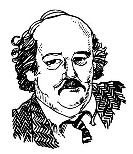(Syndicated to Kansas newspapers Sept. 29, 2014)
 Yes, much of the recent press was about the Kansas Supreme Court overruling law professor/Secretary of State Kris Kobach’s assertion that Democrat U.S. Senate primary election winner Chad Taylor had inadequately professed that he was incapable of serving in the U.S. Senate.
Yes, much of the recent press was about the Kansas Supreme Court overruling law professor/Secretary of State Kris Kobach’s assertion that Democrat U.S. Senate primary election winner Chad Taylor had inadequately professed that he was incapable of serving in the U.S. Senate.
The case, still being wrung out before a Shawnee County District Court three-judge panel, may determine whether a Kansas City Democrat was disenfranchised by Taylor’s removal from the November ballot—and goes several other ways in the politics of the Kansas Statehouse.
And, yes, we’re going to see some battling between the Legislature, possibly the governor, and the courts no matter how that matter finally turns out.
Because, well, the Legislature is the Legislature and, because the Legislature writes the check for the Supreme Court operations, it doesn’t like to be overruled—especially when it is run by Republican lawmakers who have little tolerance for their Republican secretary of state being overruled.
The high court may have dodged an initial bullet when Supreme Court Chief Justice Lawton Nuss cannily got a unanimous decision from his court that Kobach was wrong, that Taylor was right and that Taylor, who is Shawnee County District Attorney, didn’t have to actually carve into stone the word “incapable” to get off the November general election ballot.
A split decision would have identified justices who—regardless of the actual basis for a ruling—voted for Kobach or voted against Kobach. That’s a sharp divide and if Kobach wins reelection, he’ll be around to encourage sanctions of some sort against the court, or at least those justices who opposed him and, by implication, three-term U.S. Sen. Pat Roberts, R-Kan.
It could be as simple as the Legislature just cutting the court’s budget, reducing justices to driving economy cars to the Judicial Center, where they might lose their indoor private parking spaces. Or, it could be a little stealthier, possibly putting a mandatory retirement age on justices, which could force retirements or resignations.
Or—and this is the one to watch for—a proposed constitutional amendment on the 2016 ballot that would let the governor select his own appointees to the court without the intervention of the nonpartisan, lawyer-heavy Supreme Court Nominating Commission, which vets applicants for high court vacancies and sends the governor a list of three from whom to choose.
That means, essentially, that a sitting governor could over time pack the court with politically and philosophically like-minded jurists who would shape life in Kansas for decades.
Or, it might even go to requiring justices to run for office…a tack that would essentially evaporate the relatively nonpolitical fog in which the court operates.
Yes, the high court has ruled against the Legislature occasionally—take the spate of school finance decisions in recent years—but those decisions have been of a different nature, against the entire Legislature and bills signed into law by the governor, while this off-the-ballot decision, well, it has a different feel. It’s a decision that changes the politics of the state, an area where the Legislature doesn’t like to see the court meddling.
What’s gonna happen?
Something…count on it. Probably less dramatic action taken against the court if Roberts is reelected, probably more if Roberts loses and independent candidate Greg Orman is elected with a margin that can be statistically attributed to not having another candidate (besides Libertarian Randall Batson of Wichita) on the ballot.
We’ll see what the district court panel does, but at this point, the Supreme Court has put itself in the bull’s eye…
